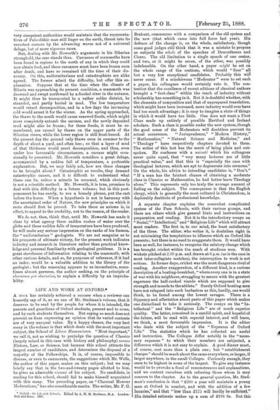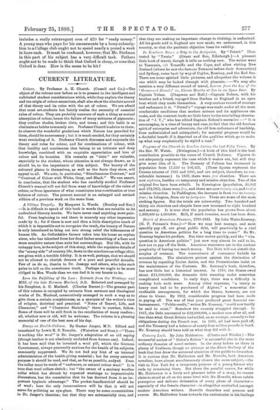LIFE AND WORK AT OXFORD.*
A BOOK has certainly achieved a success when a reviewer can honestly say of it, as we can of Mr. Stedman's volume, that it deserves to be read by the people for whom it is intended, the parents and guardians of Oxford students, present and to come, and by such students themselves. But saying so much does not prevent us from expressing an opinion that its varied contents are of very unequal value. By a happy chance, the very best essay in the volume is that which deals with the most important subject, the School of Literm Humaniores. "Most important," we call it, not as wishing to prejudge the question of Classics (largely mixed in this case with history and philosophy) versus History, Law, or Science, but because this school attracts the largest number of candidates, and determines the disposal of a majority of the Fellowships. It is, of course, impossible to discuss, or even to enumerate, the suggestions which Mr. Wells, the author of this paper, makes on this subject ; but we may briefly say that in the two-and-twenty pages allotted to him, he gives an admirable résumé of his subject. No candidate, in reading for this school, should fail to make himself acquainted with this essay. The preceding paper, on "Classical Honour Moderations," has also considerable merits. The writer, Mr. F. G.
• Oxford : its Life and Schools. Edited by A. M. M. Stedman, LA. London : Bell and Bons. 1887. Brabant, commences with a comparison of the old system and the new (that which came into full force last year). His defence of the change is, on the whole, satisfactory, though some good judges still think that it was a mistake to propose as subjects the whole of the speeches of Demosthenes and Cicero. The old limitation to a single speech of one orator, and two, or it might be seven, of the other, was possibly indefensible. On the other hand, a paper might be set on the whole range of the orations, which would " floor " all but a very few exceptional candidates. Probably this will never occur. If a mischievous " Moderator " were to set such a paper, his colleagues would certainly veto it. The con- tention that the excellence of recent editions of classical authors brought a " first-class " within the reach of industry without scholarship has something in it. But it is doubtful whether, with the elements of composition and that a unprepared translation, which might have been increased, mere industry would ever have had too much advantage ; it is easy to imagine a state of things in which it would have too little. One does not want a First Class made up entirely of possible Hertford and Ireland scholars. Such a class is possible under the new system, though the good sense of the Moderators will doubtless prevent its
actual occurrence. " Jurisprudence," "Modern History," " Mathematics," "Natural Science and Medicine," and " Theology " have respectively chapters devoted to them. The writer of this last has the merit of being plain and out- spoken. He confesses with a naiveté which his colleagues never quite equal, that "very many lectures are of little practical value," and that this is "especially the case with theological lectures, which are apt to degenerate into sermons." On the whole, his advice to intending candidates is, "Don't." "If a man has the faintest chance of obtaining a moderate class in Classics or Mathematics, he had better leave Theology alone." This represents only too truly the average amount of feeling on the subject. The consequence is that the English clergy, which is generally the most cultured in Christendom, is deplorably destitute of professional knowledge.
A separate chapter explains the somewhat complicated system of the Pass Schools, with their various groups, and there are others which give general hints and instructions on preparation and reading. But it is the introductory essays on "Social," "Intellectual," and "Religious Life" which will attract most readers. The first is, to our mind, the least satisfactory of the three. The editor, who writes it, is doubtless right in not minimising the temptations to idleness which an Oxford life presents ; but there is no need to exaggerate them. It would have been as well, for instance, to recognise the salutary change which has brought cricket within the reach of studious men. With wickets pitched at 2.30 p.m. and drawn at 6 p.m. (as is the case in most inter-collegiate matches), the interruption to work is not serious. In former days, cricket was the most dangerous rival of reading. Another exaggeration, of a different kind, is a curious description of a boating-breakfast, "where every one is in a state of war with his neighbour, struggling to secure with the greatest eagerness the half-cooked viands which are supposed to give strength and muscle to the athlete." Surely Oxford boating-men have not relapsed into such barbarism as this, hardly, one would think, to be found among the lowest savages. There is a flippancy and affectation about parts of this paper which makes one disinclined to take it seriously. The essays on the " In- tellectual " and the "Religious Life" are of much superior quality. The latter, conceived in a candid spirit, and hopeful of the future, will be read with especial interest, and will leave, we think, a most favourable impression. It is the editor who deals with the subject of the "Expenses of Oxford Life." The statistics which he has collected are useful and instructive. The Colleges differ notably in the "neces- sary expenses " to which their members are subjected, a difference which it is not easy to explain. A good dinner must, of course, cost more than a plain one ; but "establishment charges" should be much about the same everywhere, or larger, if larger anywhere, in the small Colleges. Curiously enough, they seem to be highest in some of the largest. To give any instance would be to provoke a flood of remonstrances and explanations, and we content ourselves with referring those whom it may concern to the chapter. As to the general question, Mr. Sted- man's conclusion is that "£200 a year will maintain a young man at Oxford in comfort, and with the addition of a few luxuries," and that "less than 2175 will hardly be sufficient." His detailed estimate makes up a sum of £194 8s. But this
includes a really extravagant sum of 220 for "ready money." A young man who pays for his amusements by a lump subscrip- tion to a College club ought not to spend nearly a pound a week in loose cash. It must be confessed, however, that Mr. Stedman in this part of his subject has a very difficult task. Fathers ought not to be made to think that Oxford is cheap, or sons that Oxford is dear. How is the mean to be hit ?







































 Previous page
Previous page